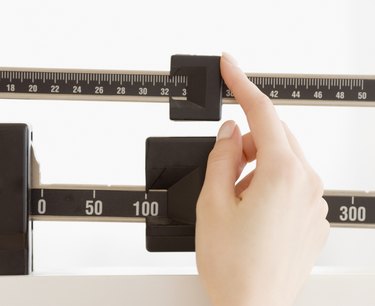
Restricting your daily intake to 1,200 calories per day requires diligence and, oftentimes, hunger. With that effort and deprivation, you would expect to lose weight. When the opposite happens and the scale numbers go up, however, you may feel like throwing in the weight-loss towel and eating with abandon. Before you decide that you just cannot lose weight, re-evaluate your weight-loss strategy and expectations.
Give Weight Loss Time
Video of the Day
If you've been consuming 1,200 calories per day for just a few days, you may not be giving yourself enough time to see results. The scale measures not just fat weight, but fluid retention, bone and muscle mass. Your scale weight can fluctuate by as much as 5 pounds day to day depending on water retention, hormones or constipation. Most people weigh more Sunday night and weigh the least on Friday morning, shows a study performed by Cornell University researchers in 2014.
Video of the Day
Weigh yourself just once per week to avoid the daily ups and downs that can be frustrating. If seven to 10 days go by and you still haven't lost at least a few ounces, you might need to consider other hindrances to your loss.
Portioning Food For a 1,200-Calorie Plan
You may think you're eating just 1,200 calories per day, but you can only be certain if you weigh and measure your food. Invest in a set of measuring cups, measuring spoons and a food scale. If you eyeball portion sizes, you're far more likely to underestimate serving sizes. A food log can help you be sure all your meals add up to the 1,200-calorie goal you have set for yourself, too.
On the other hand, you could be getting too many calories through no fault of your own. If you're eating only prepackaged foods and restaurant foods, their published calories may be off. A study in a 2010 issue of the Journal of the American Dietetic Association found that packaged foods may contain as much as 8 percent more calories and restaurant foods 18 percent more calories than listed. This means that if the menu's meal information states it has 400 calories, it may contain as much as 472 calories. When you're sticking to a strict calorie intake, these little calorie miscalculations may stall your weight loss.
Stressing Out Over Calories
Unpaid bills, impending work deadlines and your weight loss cause stress that can impede weight loss. Being stressed can cause you to pump out the hormone cortisol, which is a double-whammy against weight loss: It makes you crave high-calorie foods and encourages the storage of those calories as fat, oftentimes around the belly. Your body can't distinguish between the stress of not getting your office spreadsheet done and the stress your ancestors faced to survive, even though only the latter requires that stored energy in the form of fat.
Restricting your calorie intake is another layer of stress that can cause you to release cortisol and, ironically, inhibit fat loss. A study published in Psychosomatic Medicine in 2010 found that monitoring and restricting your caloric intake act as psychological and biological stressors, resulting in increased cortisol production.
Muscle Gain and Weight
If you've been consistently eating 1,200 calories and working out for at least a month, you may be trading fat for a bit of muscle weight. Check how your clothes fit -- you may notice that despite the lack of change on the scale, the waistband is looser and pant legs fit less snugly. This is because a pound of muscle takes up less space than a pound of fat. Your gross weight may not change, but your body looks leaner and fitter. Consider using body fat measurements as a sign of progress, rather than scale weight.
If you're sure you haven't changed your body composition, but you've been eating just 1,200 calories per day and working exceptionally hard at the gym, you may be undereating. Too little food means you may not have the energy to put into your workouts, so they're lackluster. Your body may also start eating into your lean muscle mass and storing more fat, to save you from what it perceives as an impending famine.
Adjusting Your Weight-Loss Strategy
For many people, 1,200 calories is just too few calories, and you'll be more successful if you actually increase your intake to 1,500 to 1,800 calories per day. In turn, you'll likely be able to work out harder, feel less deprived and still lose weight.
Make sure most of your meals contain healthy, unprocessed foods. Eggs, oatmeal, yogurt and berries are good breakfast foods. Salads, broth-based soups, whole grains and grilled meats, poultry and fish make quality lunches and dinners. These foods contain ample nutrients -- particularly protein and fiber -- that help you feel full, so you can stick to a reduced calorie plan without extreme hunger. Round out your meals and snacks with fruits and non-starchy vegetables because they'll satisfy you in fewer calories, and provide vitamins, minerals and fiber for good health.
In some cases, a medical issue may cause you to hold onto weight. If you're concerned this may be the case, talk to your doctor about possible causes.
- Cornell University Food and Brand Lab: Whether You Lose or Gain Weight Depends on Weekdays
- Ask the Dietitian: Overweight and Weight Loss
- Fitness: 6 Reasons You're Not Losing Weight
- Journal of the American Dietetic Association: The Accuracy of Stated Energy Contents of Reduced-Energy, Commercially Prepared Foods
- Time: Dieters Beware: Calorie Counts Are Frequently Off
- Psychology Today: Why We Gain Weight When Stressed
- Psychosomatic Medicine: Low Calorie Dieting Increases Cortisol
- Oxygen Women's Fitness: Are You Underfueling?
- Shape: Ask the Diet Doctor: How Many Calories Should I Eat to Lose Weight?